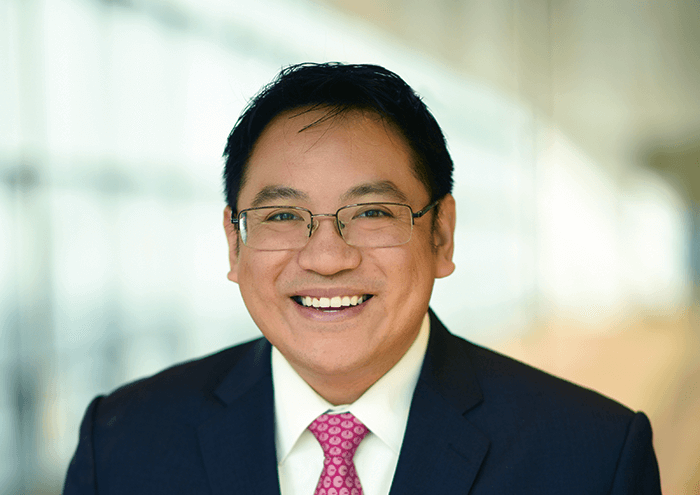
It’s a real honor – especially for all of us young clinicians and scientists on the list. These are the kinds of things that help us gain traction in our careers. It really feels like a blessing to be recognized.
My training started at Hopkins with Sol Snyder. As an MD PhD, from the beginning, I was always thinking about how to find my place in a translational world. I chose ophthalmology because you can wear both medical and surgical hats at the same time; I felt it would give me a comprehensive overview of everything that I could then draw scientific questions from. Then it was: glaucoma versus not glaucoma? The issue is that glaucoma never makes good grand rounds – there’s no diagnostic mystery, right? What does almost every patient who walks into a glaucoma clinic have? Glaucoma. Instead, you’re faced with a multitude of ways to handle it and it’s about customizing the treatment to that patient in terms of what they have, what they need and where they are at that moment in time. In my case, putting together the gestalt of the treatment plan was more exciting and also offered more research potential than if I was more concentrated on the diagnosis of different ophthalmic disorders.
There has been a big push by the NIH to focus on personalized medicine. Big data is very important because it helps us understand fundamental principles – but not everyone is the same. The combination of the NIH’s mission of customizing each individual’s treatment with glaucoma care has resulted in early surgery with more minimal techniques taking hold – and this approach will likely play an even greater role in the future. As an example of my research, aqueous angiography is a technique that might help you customize glaucoma surgical treatment to individual eyes as it tells you where the aqueous humor is flowing. One of my mentors, James Tan, taught me about a patient who came to him and said, “Doctor, I didn’t actually feel like I had glaucoma until I started eye drops.” It was the irritation from the drops that made him say this and while most ophthalmologists start with drops first – that might change. As James was alluding to, if we can get more effective, smaller surgeries to the forefront, then maybe people can use fewer drops, and in a way, not feel like they have a disease.
After my graduate training with Sol, Robert Weinreb greatly influenced me and my thinking. My glaucoma fellowship at UCSD with Robert was a major turning point for me in terms of my career. First, he gave me a lot of freedom; most fellows who are trying to push down the clinician–scientist road feel a lot of pressure to carry out any productive research – no matter how small – to demonstrate scientific achievement and momentum. Robert emphasized this too, but he also gave me some flexibility and freedom too – he really encouraged me to spend time reading the field and simply writing about research topics that interested me. There were times that I was writing with no audience that I’d be able to submit to. He just wanted me to write to organize my thoughts into a research program. As a result, we threw out all sorts of little grants here and there during my fellowship, and the truth is, every single one failed! But that one year gave me a vetting experience. Through that process, I internalized and seriously weighed every remark, suggestion, and criticism so that when I came out as faculty and started applying for broader research support, it looked like I had my ducks in a row right away – but that was never true! Robert gave me the opportunity and time to explore and most importantly to fail so that then I could be set up for success.
From Sol Snyder, it was: work on something that’s important to you, because then you’ll have the energy and the desire to move forward no matter how hard it gets. Robert Weinreb told me to always value the people, irrespective of the brand. The key there is to identify a person that you can develop a trustworthy working relationship with – that’s probably one of the best pieces of advice he’s given me. Srinivas Sadda said, “When you’re young, just go for everything. Good things will come, and take it from there.” At an early stage, none of us are smart enough to know if any endeavor will pay off – or what won’t.
Mentoring is more important than you think, so have as many mentors as possible – especially ones at different stages of their career and ones you can actually go to and ask questions. Don’t be afraid, there’s no ego here – there’s only one goal and the goal is to succeed. You can only succeed if you get help and learn from people who’ve been there in the past.
